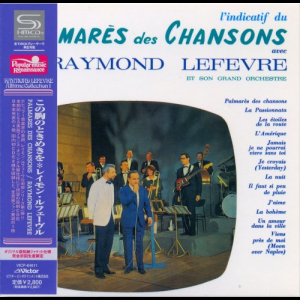Raymond Lefevre - Palmares des Chansons Nº1 '1965 [2009]

| Artist | Raymond Lefevre Related artists |
| Album name | Palmares des Chansons Nº1 |
| Country | |
| Date | 1965 [2009] |
| Genre | Instrumental |
| Play time | 00:29:46 |
| Format / Bitrate | Stereo 1420 Kbps
/ 44.1 kHz MP3 320 Kbps |
| Media | CD |
| Size | 219 mb (+3\%rec.) |
| Price | Download $1.95 |
Order this album and it will be available for purchase and further download within 12 hours
Pre-order album Tracks list
Tracks list
The instrumental smash Ame Câline vaulted conductor and arranger Raymond LeFevre to the front ranks of the easy listening renaissance that followed the commercial vogue for stereophonic sound. Born in Calais, France on November 20, 1929, LeFevre studied flute as a child and at 16 entered Paris Conservatoire National de Musique, moonlighting as a jazz pianist in local clubs and cabarets. After a stint behind jazz bandleader Hubert Rostaing, LeFevre joined conductor Bernard Hildas Club des Champs-Elysées orchestra. He established himself as a composer and arranger during a lengthy tenure as a Barclay Records staffer, concurrently serving six years behind Egyptian born singer Dalida and in 1957 scoring the first of more than a dozen films with director Guillaume Radot, Fric-Frac en Dentelles. A year later, LeFevre notched a minor U.S. hit with his interpretation of Gilbert Bécauds Le Jour Ou La Pluie Viendra, retitled The Day the Rains Came for American consumption. By this time, he was also established as the musical director for the French television variety series Musicorama, leading his orchestra in accompaniment of countless singers. While scoring the 1964 feature Faites Sauter La Banque!, LeFevre first collaborated with fellow easy listening maestro Paul Mauriat, his greatest commercial rival in the years to follow. While Mauriat scored the biggest instrumental hit of the period with the chart-topping Love Is Blue, LeFevres lush symphonic approach was a fixture on the European pop charts throughout the 60s as consumer demand for stereo recordings guaranteed impressive sales for singles including La La La (He Gives Me Love), Puppet on a String, and A Whiter Shade of Pale. He scored his biggest hit in 1968 when composer Michel Polnareffs haunting Ame Câline (aka Soul Coaxing) emerged as a staple on pirate station Radio Caroline, and while his commercial fortunes dwindled in the decade to follow, LeFevre remained a ubiquitous presence in French cinema, winning widespread acclaim for the 1971 thriller score Jo. He also continued recording until 2001, enjoying his greatest commercial renown in Japan. LeFevre died in Seine-Port, France on June 27, 2008. Tracks: 01. Palmares Des Chansons (01:37) 02. Io Che Non Vivo (02:43) 03. Jaime (02:23) 04. Un Amour Dans La Ville (02:19) 05. Nuit (02:40) 06. Les Etoiles De La Rout (02:47) 07. La Passionata (02:41) 08. Yesterday (02:33) 09. La Boheme (02:28) 10. Moon over Naples (02:43) 11. Il Faut Si Peu De Pluie (02:25) 12. Lamerique (02:20)
Raymond Lefevre
Album
- 2011 Jo / Les Grandes Vacances
- 2010 Le Gendarme Et Les Extraterrestres
- 2010 Le Gendarme Et Les Gendarmettes
- 2010 Le Gendarme Se Marie
- 2010 Le monde charmant de Raymond Lefèvre
- 2010 Louis Und Seine Verrückten Politessen
- 2006 The World Of Raymond Lefevre
- 2005 Colezo! Twin
- 2003 Raymond Lefevre (CD5) Pop Classics
- 2003 Raymond Lefevre (CD4) Italian Hits
- 2003 Raymond Lefevre (CD3) French Hits
- 2003 Raymond Lefevre (CD2) World Hits
- 2003 Raymond Lefevre (CD1) La Reine De Saba / Original & Standard Hits
- 1995 Pop Classical
- 1988 Raymond Lefevre Digital.the Music Of The Night
- 1987 Les Plus Grands Succes De Raymond Lefevre
- 1984 Soul Symphonies
- 1984 Lets Dance
- 1983 Concerto
- 1983 Jet Stream
- 1982 Raymond Lefevre Et Son Orchestre 'operamania'
- 1982 Operamania
- 1980 Tomorrows Symphonies Du Futur
- 1979, 1980 [2017] Holiday Symphonies & Tomorrows... Symphonies Du Futur
- 1976 [2009] Les plus Grands Succes 76
- 1976 Les Plus Grands Sucess '76
- 1976 Raymond Lefevre Et Son Grand Orchestre #21
- 1976 Raymond Lefevre Et Son Grand Orchestre No.21 [vicp-70125] japan
- 1974 Raymond Lefevre Et Son Grand Orchestre #18
- 1974 Raymond Lefevre Et Son Grand Orchestre #19
- 1973 Raymond Lefevre Et Son Grand Orchestre # 17
- 1972 Raymond Lefevre Et Son Grand Orchestre #16
- 1971 Raymond Lefevre Et Son Grand Orchestre #14
- 1971 Mammy Blue
- 1971 Romantic Melodies [vol.01 &02]
- 1971 Raymond Lefevre Et Son Grand Orchestre No.14 (vicp-70118)
- 1970 Palmares Des Chansons #12
- 1970 Palmares Des Chansons 12 - Ai No Sadame (vicp-64620)
- 1969 Palmares Des Chansons #10
- 1969 Palmares Des Chansons #9
- 1969 Palmares Des Chansons 10 - Je T'aime (vicp-64619)
- 1969 Palmares Des Chansons 9 - Jours En France (vicp-64618)
- 1968 Soul Coaxing (ame Caline)
- 1968 Chansons De La Nuit
- 1967 Raymond Lefevre And His Orchestra
- 1965 [2009] Palmares des Chansons Nº1
- 1965 Palmares Des Chansons #1
Anthology
Compilation
